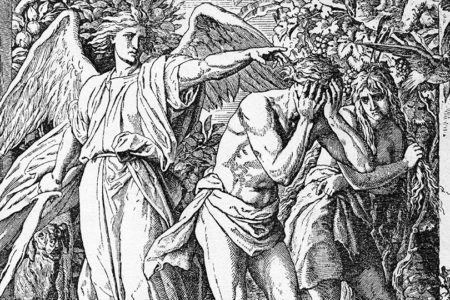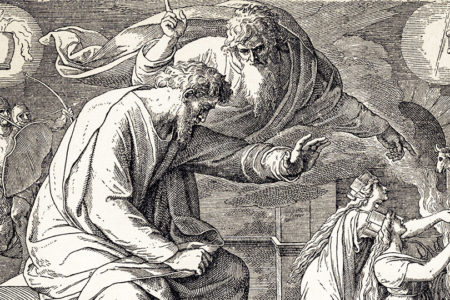God and Wisdom Part One
In three previous articles we have seen that the triune God of the Bible is inseparably related to truth. God is the source of ultimate, valid truth. In a closely related way, the triune God of the Bible is also inseparably related to wisdom. He is the source of ultimate, valid wisdom.
God’s Possession of Wisdom
People in ancient times recognized that God possesses great wisdom. Media-Persia’s King Artaxerxes indicated that Ezra’s God possessed wisdom (Ezra 7:25). Job’s “friend” Zophar asserted that God is able to reveal the hidden things of wisdom (Job 11:6). Job declared that wisdom is with God and that God is wise in heart and, in contrast with man, the only one who comprehends where ultimate wisdom and understanding can be found (Job 9:4; 12:13; 28:12–13, 20, 23).
proverbs 21:30 asserts that there is no human wisdom, understanding, or counsel capable of circumventing or nullifying God’s wisdom. Isaiah declared that God is wise (Isa. 31:2). Jeremiah signified that none of the wise men in the world could compare with God in wisdom (Jer. 10:7). daniel claimed that wisdom is the possession of the God of heaven (Dan. 2:19–20).
Paul asserted that God ordained His wisdom before the world came into existence (1 Cor. 2:7). He emphasized that God’s wisdom is profoundly unfathomable to man and that God is the only one who is wise in the ultimate sense of wisdom (Rom. 11:33; 16:27; 1 Tim. 1:17). paul also indicated that in His wisdom God established things in such a way that the world of mankind does not know God through humanly devised wisdom (1 Cor. 1:21). Human beings cannot discover God’s wisdom through their senses or ability to reason (1 Cor. 2:9). The only way they can obtain His wisdom is if He reveals it to them (1 Cor. 2:10) since it is hidden from them until He chooses to reveal it (1 Cor. 2:7).
Paul signified that God revealed to the apostles and New Testament prophets His will that had been unknown prior to their time (Eph. 1:9). In His wisdom (Eph. 1:8) He willed to provide abundant spiritual blessings to human beings in Jesus Christ by His grace (Eph. 1:3–14) and to devise a means to remove the centuries’ old enmity that existed between Jewish people and Gentiles and bring them together in peace in one new body, the church (Eph. 2:11—3:9). Through creating the church, God revealed aspects of His wisdom that formerly were unknown to angels in the heavenly realms (Eph. 3:10).
Jude indicated that God is the only one who is wise in the ultimate sense of wisdom (Jude 25). Revelation 7:11–12 portrays heavenly beings worshiping God by ascribing wisdom to Him.
The Origin and Source of Wisdom
Some translations of proverbs 8:22 indicate that God “possessed” wisdom before He created all parts of the universe. However, the word translated “possessed” can also mean “created,” and the fact that wisdom is said to have been “established” (v. 23) and “brought forth” (v. 24) implies that God created wisdom in eternity past before He created the universe.1 Thus God is the source of ultimate wisdom.
The Distribution of Wisdom
Through two questions directed to Job, God insinuated that He is the one who invested human beings with true wisdom (Job 38:36). Proverbs 2:6–7 declares that God gives wisdom and reserves sound wisdom for righteous people. The preacher of Ecclesiastes asserted that God gives wisdom to people whom He considers to be good (Eccl. 2:26).
The Scriptures record examples of God distributing wisdom. Pharaoh, King of Egypt, recognized that God gave Joseph great wisdom through His Spirit (Gen. 41:38–39). Centuries later Stephen indicated that God gave Joseph wisdom that impressed Pharaoh (Acts 7:10).
God told Moses that He filled crafts-men with “the Spirit of God, in wisdom” to enable them to make priestly garments for Aaron and his sons, the tabernacle, Ark of the Covenant, mercy seat, tabernacle furniture, lampstand, altar of incense, altar of burnt offering, laver, cloths of service, anointing oil, and sweet incense the way that God commanded (Ex. 31:1–11; 35:30—36:1).
David declared that God would make him know wisdom in his inner parts (Ps. 51:6).
God gave King Solomon wisdom that far surpassed the wisdom of people of other nations (1 Ki. 4:29–30). As a result, all Israel recognized that God’s wisdom was in him (1 Ki. 3:28); his fame spread to areas beyond Israel, and people of other nations traveled to Jerusalem to hear his wisdom (1 Ki. 4:31–34).
Daniel declared that God gives wisdom to the wise and thanked God for giving him wisdom (Dan. 2:21, 23).
Paul prayed that God would give believers the spirit of wisdom (Eph. 1:17) and fill them with the knowledge of His will in all wisdom (Col. 1:9). The epistles Paul wrote contain the wisdom God gave to him (2 Pet. 3:15–16; see 1 Cor. 2:7, 10–13).
God gives wisdom to those who lack it but ask for it (Jas. 1:5).
These examples of God giving wisdom to human beings reinforce the fact that God is the source of ultimate wisdom.
God’s Use of Wisdom in Creation
The psalmist declared that God made all His works of creation in wisdom (Ps. 104:24). He created the heavens (Ps. 136:5) and earth by His wisdom (Prov. 3:19; Jer. 10:12). Isaiah 40:12–28 emphasizes that only God had the wisdom or understanding necessary to create the universe.
Old Testament scholars have concluded that God created the universe with a fixed, unchanging, inflexible order that conforms to and embodies the ultimate wisdom that He created in eternity past and used to bring the universe into existence.2 Not surprisingly, human experience and scientific research have demonstrated that a fixed, unchanging, inflexible order of natural law exists in the universe. That order of natural law is no respecter of persons, regardless of their position or status in life. Any violation of that order can exact a high price. For example, anyone who challenges the fixed, unchanging, inflexible law of gravity by stepping off the top of a 20-story building without special equipment will suffer serious consequences. challenging the fixed, unchanging, inflexible order of natural law can result in loss of honor, enslavement by sin, severe harm of soul, and even premature physical death (Prov. 2:16–19; 5:3–23; 6:24–35; 7:7–27; 9:13–18).
Proverbs emphasizes that God also created the universe with a fixed, unchanging, inflexible order of moral law. Allen P. Ross described it as “a fixed, eternal religious order.”3
Bruce K. Waltke stated, “The theological significance of the book of Proverbs rests in its clear affirmation that Yahweh brought ‘wisdom’ into existence, revealed it to man, and as Guarantor upholds this moral order.”4 Waltke wrote the following concerning the biblical meaning of wisdom:
The figures of speech used in the first section of Proverbs (1:2—9:18) suggest that it is Yahweh’s eternal and righteous order granting life to those who walk in it. In 1:20–33 wisdom is likened to a street preacher (Lady Wisdom) who laughs at the calamity of the fools who ignored her or disdainfully rejected her, that is, it is an inviolable righteous order. In 3:18 it is referred to as a tree of life in the midst of time. According to 3:19–20 it was God’s instrument for creating the cosmos. The point of this statement seems to be that wisdom is the principle that accounts for order and life found in creation. In 4:10–27 in a series of poems it is designated “the way,” that is, it is an ordered realm without imperfections. In 8:1–11 an evangel proclaims that righteousness, justice, and truth are the way to lasting well-being. In 8:22 wisdom is likened to a craftsman at Yahweh’s side delighting above all in man at the time of creation. The point of this comparison seems to be that it is an eternal order existing for man’s good. Finally in 9:1–18 Dame Wisdom contends with Dame Folly in their rival invitations for the soul of the simple-ton. In a word, wisdom is a potent righteous force opposed by a potent unrighteous force.5
This biblical concept of wisdom prompted Waltke to write, “No longer can wisdom be defined simplistically as ‘the practical application of knowledge.’ Instead wisdom must be thought of as a broad, theological concept denoting a fixed, righteous order to which the wise man submits his life.”6
The Foundation and Beginning of Wisdom
Since the God of the Bible is the creator and source of ultimate wisdom, the Scriptures indicate that knowledge of God and a right attitude toward Him are essential for mankind to possess true wisdom. Job expressed it this way: “’Behold, the fear of the Lord, that is wisdom’” (Job 28:28). Psalm 111:10 states, “The fear of the Lord is the beginning of wisdom.” Proverbs asserts that “The fear of the Lᴏʀᴅ is the beginning of wisdom, and the knowledge of the Holy One is understanding” (9:10); and “The fear of the Lᴏʀᴅ is the instruction of wisdom” (15:33).
Thus, the foundation and starting point for possession of true, ultimate wisdom consist of knowledge of God’s existence, thoughts, and ways and a reverential trust in Him, His thoughts, and ways. Proverbs 3:5–7 states,
Trust in the Lᴏʀᴅ with all your heart, and lean not on your own understanding; in all your ways acknowledge Him, and He shall direct your paths. Do not be wise in your own eyes; fear the Lᴏʀᴅ and depart from evil.
Any system of thought that does not have this foundation and starting point does not possess true, ultimate wisdom.
In light of this emphasis in Proverbs, Allen P. Ross indicated that the Bible requires “a personal faith in a personal God. To the Hebrews the success of wisdom did not simply require a compliance with wise instructions but trust in, reverence for, and submission to the Lord (Prov. 1:7; 3:5–6; 9:10), who created everything and governs both the world of nature and human history (3:19–20; 16:4; 21:1).”7
ENDNOTES
- Allen P. Ross, “Proverbs,” The Expositor’s Bible Commentary (Grand Rapids: Zondervan, 1991), 5:946.
- Ibid., 885. Also, George Fohrer, “sophia,” Theological Dictionary of the New Testament (Grand Rapids: Eerdmans, 1971), 7: 495. Also Bruce K. Waltke, “The Book of Proverbs and Ancient Wisdom Literature,” Bibliotheca Sacra 136, no. 543 (1979): 233.
- Ross, 885.
- Waltke, 236.
- Ibid., 233.
- Ibid., 238.
- Ross, 885.







